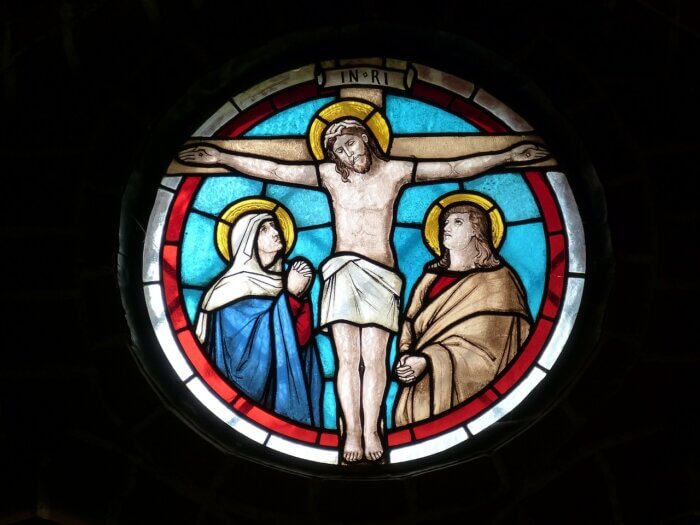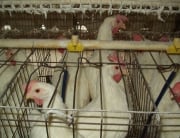
Science continues to show us that fish are, like all of God’s creatures, incredible individuals.
When times seem uncertain, as they do currently, both globally and nationally, it is, perhaps, important to discover new and meaningful ways in which to practice our Christian values of compassion, empathy, and fair play.
As it happens, we will, of course, soon be presented with one such opportunity. Lent is often understood as a time for “giving up something” in honor of Christ’s ultimate sacrifice. Thus, I invite you, this Lent, alongside an authentic spirit of self-sacrifice to, perhaps, also “give up” unhelpful notions and prejudices and, in turn, to abstain from the consumption of that which is not ours in the first place – for example, the flesh of fish and other animals.
Science continues to show us that fish are, like all of God’s creatures, incredible individuals. They enjoy complex social structures and can, it is believed, recognize shoal mates. They also learn from experience, it seems, even to the extent of changing behaviors to avoid the hazards and dangers to which they’ve seen other fish fall victim. Some fish are incredibly skilled in the use of tools. Sadly, fish are also the most widely exploited animal on Earth. In commercial fishing practices, fish are frequently scooped in the trillions from their ocean homes and exposed to the light of day, where they gasp and writhe before being cruelly bludgeoned, gutted, and beheaded. They may suffer in silence but they certainly suffer. Further, fish may not share our language or our facial features, but they do share our Creator, and this, I suggest, obliges us to protect them from harm. To put it simply (and maybe bluntly), choosing not to eat fish (and other animals) is the easiest way to achieve the kind of stewardship and guardianship of the whole of God’s creation to which each Christian is called.
Broadening our Lenten horizons further, we can say that extending compassion and kindness to all others (human and animal) is inherent not only to the Christian faith but to the essence of what it means to be human. The mutual respect that we owe each other as fellow living, breathing beings who share the planet invites us to appreciate the qualities that we all share and to accept, or even celebrate, our differences. In all the ways that matter, like feeling emotion and pain, the animals with whom many of us share our homes (like my beloved dogs, Pepe and Georgie) are not so different from the animals who we choose to eat. Sadly, unlike my pampered canine companions, animals farmed for food are treated miserably within the bleak agricultural and mechanized systems that habitually and unthinkingly commodify them. These industrialized farming operations (a horror show for fish and other animals) exist near you, hidden in plain sight. If we take a moment to see, we will notice that, trapped inside filthy factory farms, where even a gift as simple as sunlight is withheld, lambs, pigs, cows, and chickens know no mercy or kindness as they await a painful slaughter that will come all too quickly, usually while they are still just a few months old.
The Catechism of the Catholic Church teaches that there is solidarity among all creatures, arising from the fact that all beings are ultimately ordered to God’s glory (CCC §353). Bearing this in mind, the 40 days of Lent are a wonderful opportunity to abstain from indulgence and excess. In fact, this penitential season can be made all the more meaningful if we take the opportunity, even, perhaps as a conscious spiritual exercise, to consider how we can change our appetite and our customs concerning those things that mean certain death for others and which, at the same time, decisively harm the planet that we are all created to share. It’s also made everything easier, for example, with resources, inter alia, like the attached recipes from PETA.
The Lenten selflessness, which we willingly embrace when we consider the suffering of others, surely helps us to better appreciate the temptations that Our Lord faced in the desert, the place where the animals accompanied him and the angels ministered to him (Mark 1:13b). Of course, selflessness and compassion naturally transcend Lent and are virtues to which all attempting to live the Christian life aspire. Is it possible that Christians are called, in the name of Jesus, to observe the sacredness of the whole of God’s created order and, in that belief, to protect animals from cruel exploitation for their skins, flesh, eggs, and milk, and to free those same animals from testing laboratories and activities such as blood sports (like bullfighting)? In Laudato Si, Pope Francis states that “every act of cruelty towards any creature is ‘contrary to human dignity’.” (LS §92, quoting §CCC 2418). We may not hold the knife that beheads the animals that we freely choose to eat, but in wielding a fork, are we not equally culpable?
Following an ethical, plant-based diet and lifestyle isn’t ultimately about “giving up” anything, but rather, a case of choosing to no longer take that which was never ours. It’s not a hardship but a genuine joy. Truly. Giving life is genuinely life-giving.
In a spirit of Christian charity and empathy, I suggest that Lent is the perfect time to reconnect with the true meaning of our guardianship of all animals, from the smallest fish to the mightiest whales. In the name of the One who was crucified and rose again, we are surely called to be, for all fellow creatures, generous stewards and compassionate advocates.
Fr Terry Martin is a Catholic priest serving in the Parish of Worthing & Lancing. He is the author of “Animals in Heaven? A Catholic Pastoral Response to Questions about Animals” (Wipf & Stock, 2024).






